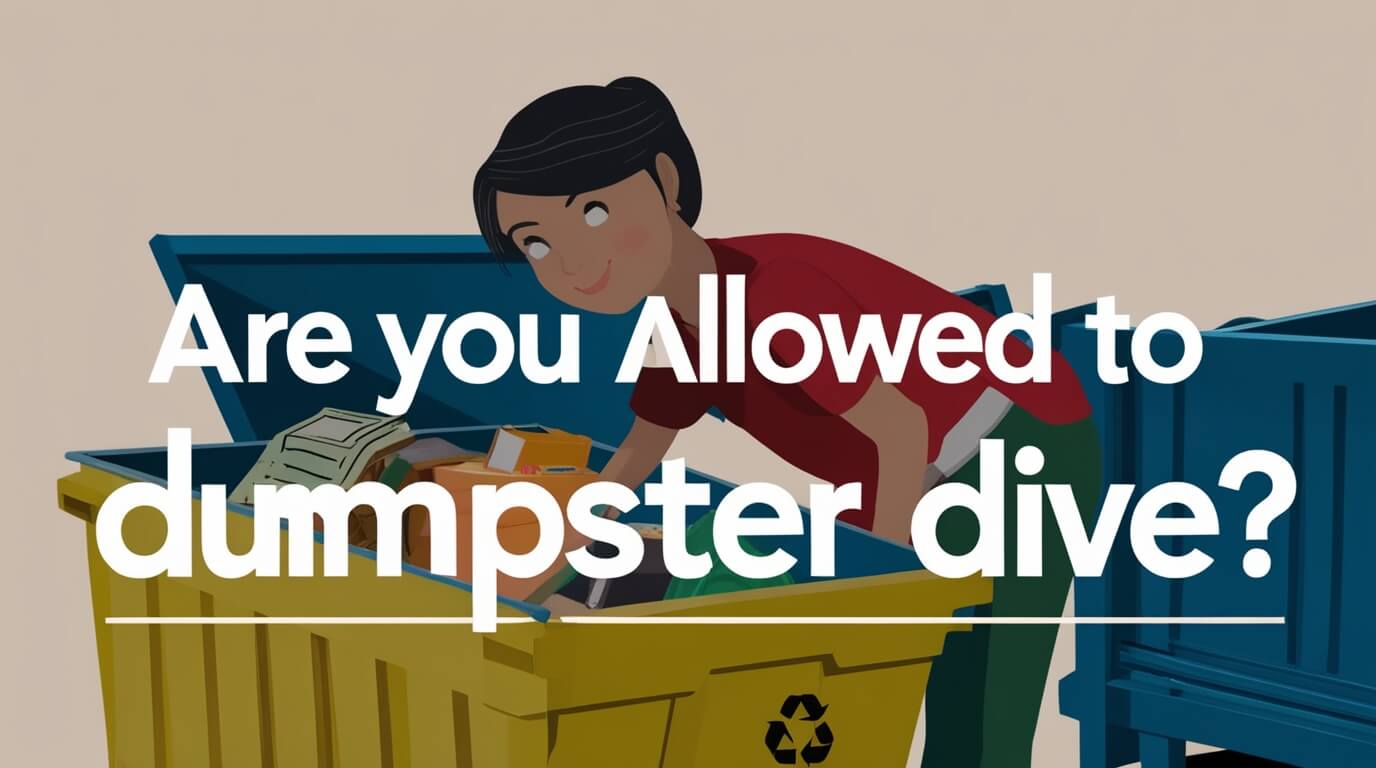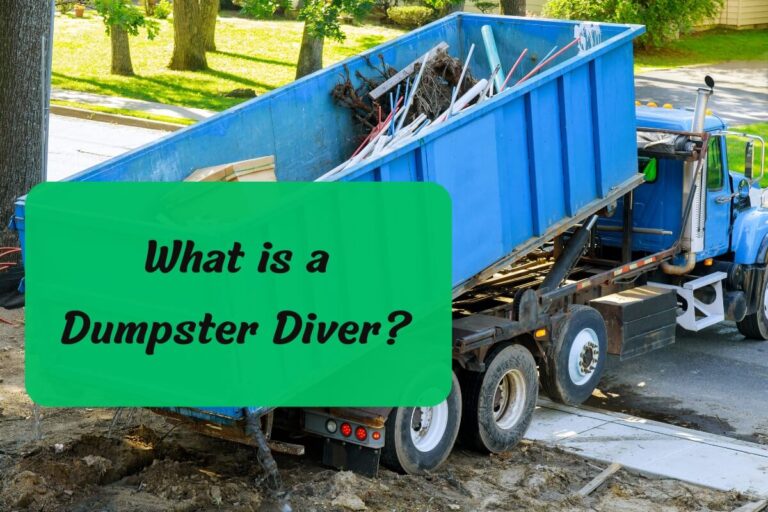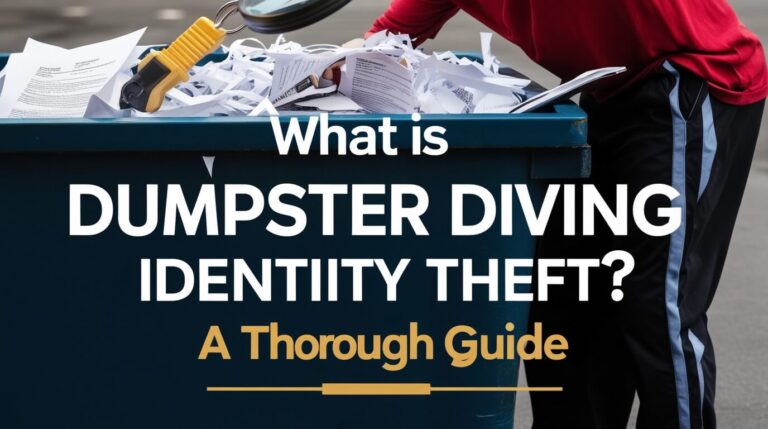
Dumpster diving might conjure up images of people rummaging through trash in search of discarded treasures, but it’s much more than that. This practice, often driven by economic necessity, environmental consciousness, or a desire to find usable items, raises an important question: Are you allowed to dumpster dive?
The short answer is yes, but with significant legal and ethical considerations.
In this comprehensive guide, we will explore the various aspects of dumpster diving, including its legality, potential risks, guidelines for safe and legal diving, and the motivations behind it. We’ll also delve into what items you might find, how to protect yourself against identity theft, the potential legal consequences, ethical considerations, and how dumpster diving practices vary around the world.
What is Dumpster Diving?
Dumpster diving, sometimes referred to as “urban foraging” or “bin diving,” involves searching through commercial or residential waste containers to find items that have been discarded but are still useful or valuable. This practice has been around for decades and is often associated with freeganism, an anti-consumerist lifestyle.
Definition and Origins
Dumpster diving is essentially scavenging through trash bins or dumpsters to retrieve items that can be reused, recycled, or repurposed. The term “dumpster diving” originated in the United States, where “Dumpster” was a brand name for large trash bins. Over time, it became a generic term for any large waste container.
Is Dumpster Diving Legal in the United States?
The legality of dumpster diving is complex and varies depending on federal, state, and local laws. Understanding these laws is crucial before you start diving into dumpsters.
Supreme Court Ruling: California v. Greenwood (1988)
In 1988, the United States Supreme Court ruled in California v. Greenwood that searching through trash left on the curb for collection is legal. The court decided that once trash is left in a public place, it is considered abandoned and anyone can take it. This ruling provides a general legal basis for dumpster diving, but there are important caveats.
Federal, State, and Local Laws
While the Supreme Court ruling provides a broad framework, state and local laws can further regulate dumpster diving. Federal law does not specifically prohibit dumpster diving, but it does not protect you from state or local regulations that might.
State-Specific Laws and Differences
Some states have specific laws regarding scavenging and trespassing that can impact dumpster diving. For instance, certain states may have stricter regulations on what can be retrieved from waste containers, especially in terms of biohazardous materials or items that could pose a health risk.
Importance of Checking Local Ordinances and City Laws
Local ordinances can vary widely. Some cities explicitly ban dumpster diving, while others may have no specific regulations. Always check the local laws in your area to ensure you are not inadvertently breaking any rules.
Legal Considerations and Risks
Even in areas where dumpster diving is generally legal, there are several legal considerations and risks to keep in mind.
Trespassing Laws
One of the most significant risks is trespassing. Dumpster diving on private property without permission can lead to trespassing charges. It’s important to distinguish between public and private property. For example, diving in a dumpster located in a public alley might be legal, while diving in a dumpster behind a gated fence is not.
Signs and Locks on Dumpsters
Dumpsters with “No Trespassing” signs or locks indicate that access is restricted. Ignoring these signs or tampering with locks is illegal and can lead to criminal charges. Always respect these indicators to avoid legal trouble.
Disorderly Conduct and Littering
Dumpster diving can sometimes result in disorderly conduct or littering charges. If you make a mess while searching through a dumpster or if your activities draw unwanted attention, you could be cited for disorderly conduct. Always clean up after yourself and try to be as discreet as possible.
Guidelines for Legal Dumpster Diving
To ensure that your dumpster diving activities are legal and safe, follow these guidelines.
Research Local Laws and Ordinances
Before diving, research the specific laws and ordinances in your area. Many city websites provide information on local regulations, or you can contact local authorities for clarification.
Seeking Permission
When in doubt, ask for permission. Many business owners are willing to allow dumpster diving if approached respectfully. Explain your intentions and assure them that you will clean up after yourself.
Best Practices for Safe Dumpster Diving
- Dress Appropriately: Wear gloves, long sleeves, and sturdy shoes to protect yourself from sharp objects and unsanitary conditions.
- Use a Light: A flashlight or headlamp can help you see better and avoid dangerous items.
- Stay Hydrated: Dumpster diving can be physically demanding, so bring water to stay hydrated.
- Dive with a Friend: It’s safer to dumpster dive with someone else in case of an emergency.
- Be Respectful: Leave the area cleaner than you found it and be courteous to any passersby or property owners.
Why Do People Dumpster Dive?
People dumpster dive for a variety of reasons, each with its own set of motivations and benefits.
Economic Reasons
Many individuals dumpster dive to save money or find valuable items they cannot afford. Food, clothing, electronics, and furniture are commonly found items. For some, it’s a way to make ends meet, especially during tough economic times.
Environmental Reasons
Dumpster diving can significantly reduce waste and promote recycling. By rescuing usable items from landfills, divers help to decrease the environmental impact of waste. This practice aligns with sustainable living principles and contributes to reducing one’s carbon footprint.
Social and Ideological Reasons
For some, dumpster diving is a lifestyle choice tied to social and ideological beliefs. Freeganism, for instance, is a movement where people aim to minimize their participation in the conventional economy by reclaiming and reusing discarded goods. This practice challenges consumer culture and advocates for a more sustainable way of living.
Common Items Found in Dumpsters
Dumpster divers can find a wide range of items, some of which might be surprising.
Food and Beverages
Food is one of the most commonly discarded items. Grocery stores, restaurants, and bakeries often throw away food that is still perfectly edible. However, there are legal concerns regarding food safety. Always inspect food carefully and avoid anything that looks spoiled or contaminated.
Electronics and Gadgets
Many valuable electronics end up in dumpsters, including phones, computers, and televisions. While some of these items may need repairs, others might be in working condition. Electronics can be a lucrative find, but be aware of the risks associated with retrieving and using electronic waste.
Clothing and Household Items
Clothing, furniture, and other household items are frequently discarded. These items are often in good condition and can be reused or donated. Divers often find these items near residential areas or college campuses.
Identity Theft and Dumpster Diving
While dumpster diving can be harmless, it can also pose serious risks related to identity theft.
Risks of Identity Theft
Criminals can retrieve personal information from discarded documents, such as bank statements, credit card offers, and medical records. This information can be used to commit identity theft.
Protecting Yourself Against Dumpster Diving Crimes
To protect yourself, shred sensitive documents before disposing of them. Businesses should also take precautions to ensure customer data is securely destroyed. Using a cross-cut shredder or a document destruction service can help safeguard against identity theft.
Legal Consequences of Dumpster Diving
Understanding the potential legal consequences is crucial for anyone considering dumpster diving.
Potential Penalties and Charges
Dumpster diving can lead to fines, criminal charges, or even jail time, depending on the severity of the offense. Trespassing, theft, and disorderly conduct are common charges associated with dumpster diving.
Real-Life Examples of Legal Cases
Several high-profile cases have highlighted the legal risks of dumpster diving. For instance, individuals have been prosecuted for trespassing while retrieving discarded items from store dumpsters. These cases serve as reminders of the importance of understanding and respecting local laws.
How to Handle Legal Issues
If you are confronted by law enforcement while dumpster diving, remain calm and respectful. Explain your intentions and cooperate fully. If you face legal charges, seek legal advice and representation to navigate the situation.
Ethical Considerations of Dumpster Diving
Beyond legality, dumpster diving raises several ethical questions.
Respecting Private Property
Respect for private property is a key ethical consideration. Always seek permission where possible and avoid diving on clearly marked private property. Balancing personal benefits with respect for others’ property rights is crucial.
Environmental Impact
Dumpster diving can have a positive environmental impact by reducing waste and promoting reuse. Responsible dumpster diving practices, such as not leaving a mess and properly disposing of non-usable items, can enhance these benefits.
Dumpster Diving Around the World
Dumpster diving practices and laws vary significantly around the globe.
International Laws and Practices
In some countries, dumpster diving is widely accepted and even encouraged as a means of reducing waste. For instance, in Germany and France, there are strong cultural movements supporting food recovery. In other countries, strict laws make dumpster diving illegal.
Cultural Attitudes Towards Dumpster Diving
Cultural attitudes towards dumpster diving can influence its acceptance and practice. In some cultures, dumpster diving is seen as a necessity and is socially accepted. In others, it is stigmatized and associated with poverty.
Global Movements and Communities
Internationally, various movements and communities support dumpster diving as a sustainable practice. These groups often organize events, share resources, and advocate for waste reduction policies. Examples include the Freegan movement and organizations like Food Not Bombs, which use recovered food to prepare meals for those in need.
Conclusion
Dumpster diving can be a resourceful and environmentally friendly practice, but it’s crucial to understand the legal and ethical implications. By researching local laws, seeking permission, and following best practices, you can safely and responsibly participate in dumpster diving. Always consider the risks and respect private property to avoid legal issues and contribute positively to waste reduction efforts.
In summary, while dumpster diving is generally legal in the United States, it requires careful consideration of local laws and ethical practices. Whether driven by economic necessity, environmental concerns, or social beliefs, dumpster diving can be a viable way to reduce waste and find valuable items. However, it’s essential to dive responsibly, respect property rights, and stay informed about the legal landscape to ensure a safe and rewarding experience.






